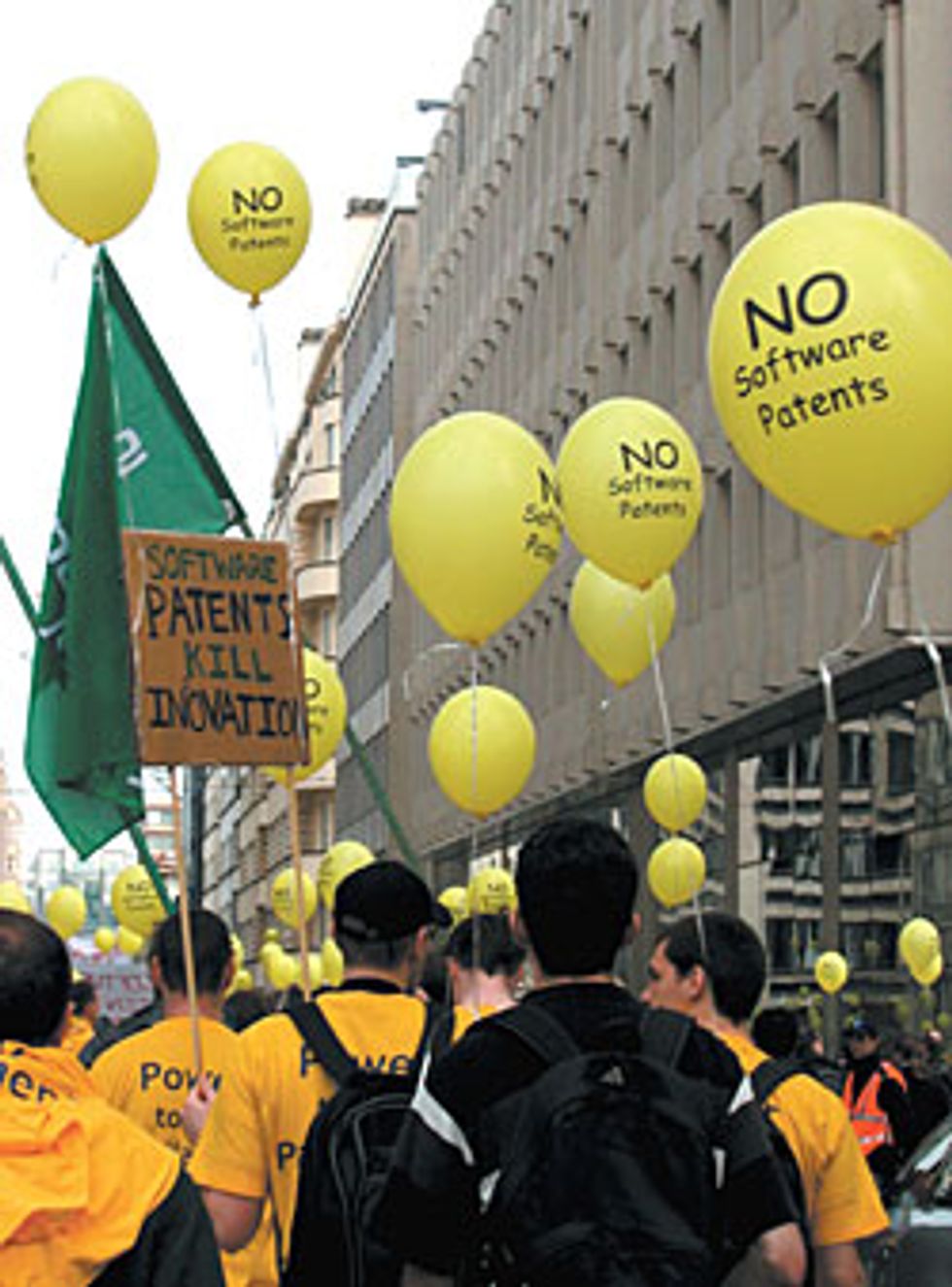Should software be patentable? This is a hotly debated question in Europe, where standards for software patenting differ from country to country. Last May, the European Union Council of Ministers, the de facto legislative body of the EU, rejected proposed legislation that would have limited the ability of companies and individuals to patent software in Europe. But the vocal forces that oppose software patents won't go down without a fight.
The controversy swirling around software patents in Europe has generated a passion rarely seen in the relatively esoteric field of patent law. Those in favor of patenting software include trade ministers and high-tech companies, such as Ericsson, Nokia, Philips, SAP, and Siemens. They argue that software patents are essential for Europe to compete against the United States and Japan, countries in which such intellectual property rights are significantly more developed.
Programmer Protest: A 14 April 2004 demonstration against software patents in Brussels, Belgium.
Microsoft Corp. and other U.S. firms represented by the Business Software Alliance, headquartered in Washington, D.C., have also argued that patents provide a powerful incentive to invest in research and development, since the limited monopoly granted by patents provides these companies with an opportunity to recoup their investments and more. They contend that patents serve the public interest by promoting disclosure of innovations that might otherwise stay hidden as trade secrets--even though most patent applications do not require the disclosure of the software code itself.
Arrayed on the other side is an even more passionate group that Business Week labeled "an army of economists [and] left-leaning politicians." These advocates were joined by software professionals, such as the founders and followers of the open-source software movement, and the Foundation for a Free Information Infrastructure in Munich, Germany, a group that favors copyright, rather than patents, as the most appropriate mechanism for protecting software vendors.
Copyright prevents other vendors from selling duplicate or modified copies of a program but still allows other vendors to create their own programs offering similar functionality, as long as those programs are not directly derived from copyrighted code belonging to someone else.
This assorted group argues that software is a unique technology that does not lend itself to patent protection. Patents tend to hurt the free and decentralized development of software, they say, pointing to the recent rapid growth of the open-source movement around the Linux operating system, the Apache Web server, programming languages such as Perl and Python, and many of the technologies that underpin the Internet.
Of particular concern to this group is that patents may also cover standards and protocols that could hinder the interoperability of different computing systems, since a license would be required to implement such standards and protocols. Because copyright permits functional duplication, interoperability could not be blocked by a copyright holder.
What's ultimately at stake in this debate is who will control the multibillion-euro software market in the EU. The antipatent contingent fears that opening the door for software patents would create a patent oligopoly dominated by the larger technology companies, throttling the freewheeling creativity that is the hallmark of the Internet and the open-source movement. The big tech companies, meanwhile, contend that a software patent regime would promote orderly innovation and more investment in virtually every field of business in which software plays an integral part.
The catalyst for this debate was the European Commission's February 2002 proposal for a directive--the legislative mechanism used to harmonize EU member states' laws--to ensure legal protections for software throughout the EU. In the proposal, the commission noted that the status of computer-implemented inventions, including software, was ambiguous because member states interpret patent law differently from one another and from the Munich-based European Patent Office (EPO). This office allows inventors to file a single application and receive patent protection in many European countries simultaneously.
Thousands of patents for computer-implemented inventions have been issued over the years by the EPO and the national patent offices, but the laws in at least some European countries appear to prohibit patents on software and business methods as such. For example, some countries allow software that controls computer hardware or other devices to be patented, but not software in general.
To deal with this ambiguity, the EPO has cobbled together a set of patent examination guidelines that tend to raise more questions than answers. Meanwhile, the EPO waits for patent laws to be harmonized across Europe with a directive from the EU.
Along the tortuous path to creating a directive, sentiments initially favored antipatent supporters. Last September, the European Parliament, which is directly elected by European citizens, adopted amendments to a draft of the directive, drastically limiting the patentability of computer-implemented inventions. These amendments were largely overruled in May, when the EU Council of Ministers--influenced by big business, the EPO, and patent lawyers--secured approval for a new draft of the directive that rolls back most of the amendments and allows patenting of a much broader range of software.
The newly elected European Parliament will probably take up the software patent issue again this fall, but the final decision lies with the EU Council of Ministers. If the parliament doesn't accept the current patent-friendly version of the directive, the council may carry out a conciliation procedure to attempt to arrive at a consensus. It would then adopt the result of the conciliation as the directive without going back to the European Parliament. In the end, it appears likely, though by no means certain, that Europe will have a software patent regime similar to those of the United States and Japan.
Author's Note: The views expressed here are the author's and do not necessarily reflect the views of his employer, Foley and Lardner LLP, or its clients.
